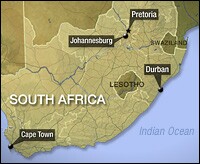Truth matters. Community matters. Your support makes both possible. LAist is one of the few places where news remains independent and free from political and corporate influence. Stand up for truth and for LAist. Make your year-end tax-deductible gift now.
Leadership Split Threatens South African Democracy


For the first time since South Africa's black-led government came to power in 1994 with the end of apartheid, the country's leadership is divided. And many worry about the danger of gridlock in a young democracy.
A bitter power struggle at the top has shaken South Africa's political foundations. During the African National Congress' annual meeting at the end of 2007, President Thabo Mbeki's political rival Jacob Zuma seized control of the ruling party.
Until December, Mbeki had been president of the nation and of the party — succeeding Nelson Mandela in both positions in 1999. But the rank and file accused Mbeki of being imperious and out of touch, and voted him out of the party post. He remains the country's leader, but the party is widely expected to name Zuma as his successor in 2009.
Until then, many say the political division has left South Africa with two power centers, which could hobble efforts to address the needs of millions who make up the poor, black majority.
"You can't really sustain a society running along such parallel lines. At some point, the system is just going to break down," says political analyst Xolela Mangcu.
Despite Denials, Divide Is Evident
Mbeki and Zuma were colleagues in the anti-apartheid struggle, and Zuma served as Mbeki's deputy president. But in 2005, Mbeki fired Zuma over corruption charges.
In a joint letter recently published in the City Press newspaper, Mbeki and Zuma both denied that the situation had created two centers of power or led to any conflict between the national presidency and the party presidency.
Soon after winning the party leadership, however, Zuma replaced Mbeki's allies who had held top party positions in parliament, business and the nation's security forces.
Zuma also has trumped Mbeki in regional relations, speaking to popular sentiment by condemning the disputed presidential election in neighboring Zimbabwe that has led to increasing violence by government supporters against anyone identified with the opposition.
Mbeki, meanwhile, has stuck to a "softly, softy" approach with Zimbabwean President Robert Mugabe, saying there was "no crisis."
Poor Suffer as a Result of Political Chasm
In South Africa — where divisions between the haves and the have-nots are growing in almost every sector — there is also unease.
Hans Versage is a member of the opposition Independent Democrats and a local councilor in a poor agricultural community. Resources are so limited in his area that doctors at the public hospital work only the first two weeks of each month.
He says public services have been affected by the political division — since it extends to both local and provincial governments.
"You can feel that dividing, that there are two powers," he says.
Versage says he is worried about where that will lead.
"I think violence is in front of the door," he says.
Mangcu, the political analyst, doesn't believe violence will erupt, but says these divisions may drag on.
"Unless you have a transcendent leader, it's something that's going to stay with us for quite a while, because the divisions and the enmity are too deep," Mangcu says.
Skepticism of Zuma's Leadership
Barney Pityana, a lawyer and theologian, argues that transcendent leader is not Jacob Zuma — not least because he was put on trial in the rape of an HIV-positive woman. Zuma was acquitted, but his reputation suffered for, among other things, his claim that he protected himself from contracting HIV by taking a shower after sex. He also faces additional corruption charges in court later this year.
Pityana says these are serious issues for the leader of a country that needs to be "catapulted out of its current morass" and that they come at a time when "we needed to capture something of our moral high ground that ... our liberation struggle is about."
"I don't think that Zuma represents the best that we could have had," Pityana says.
ANC spokesperson Jesse Duarte disagrees.
"The moral authority that Jacob Zuma does bring is one of unity and cohesion, of making sure that it is the united ANC with cohesive policies that drives the process, and not an individual who has a strong personality that drives the process," she says.
The ongoing leadership debates make it seem possible that the governing party's stiffest opposition could come not from the relatively weak parties in the country, but from within the ruling party itself.
Copyright 2022 NPR. To see more, visit https://www.npr.org. 9(MDA1OTI3MjQ5MDEyODUwMTE2MzM1YzNmZA004))







